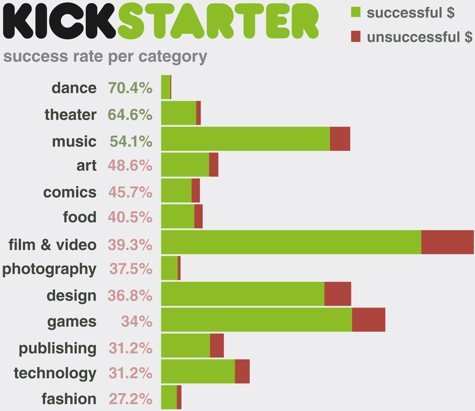Kickstarter: Dream Maker? or.. Too Good To Be True?
Everybody comes up with ideas throughout their life that they think "WOW! Now that's an amazing idea that would really sell!". Then they go on with their life, eventually forgetting about their amazing idea until it is a lost idea in your past OR.. you see it has been made by someone else who is now making big bucks. At this point, you can tell all your family and friends 'til you're blue in the face how "YOU came up with that idea FIRST" but you missed out to someone who took the initiative and is now making profit from that idea you came up first..
Growing up as a kid, long before anybody had ever heard of Kickstarter, my dad would often come home from work and announce to our family "I have a million dollar idea!" before going into his creative and, most of the time, genius ideas. Many of these ideas eventually became popular products or services we would see months or years later. Kickstarter allows people like my father to explain his million-dollar ideas to the public and request to be funded by these people if they believe in the idea. The funding can come from as many different people that are interested enough to invest money into the idea. Each project typically offers incentives to the potential investors as rewards and thank you gifts for their funding. The more money invested, the more enticing the gift. Investors for these projects are not usually big businesses but instead just average people who want to be part of something and watch an idea they see potential in come to life. Absolutely anyone with an email and money can be an investor. If the project successfully reaches the amount they have requested for funding, they are given these funds to create their project. If the funding target amount is not reached, none of the money is collected and the project must find a different route to create their project. This allows any average person with a good idea and a plan to make it, sell it, and grow, to become a business owner of their very own 'million-dollar" idea!
So is Kickstarter as amazing as it seems? If so, why isn't everyone making their ideas into booming businesses whenever they come up with a good idea? According to infographiclabs, there have been 80,093 launches projects on Kickstarter, only 33,626 of these projects have been successfully funded. This gives projects a 43.7% success rate which still seems like pretty good odds, especially considering it costs absolutely nothing to post a project to potentially be funded. When taking a closer look, the most successful projects are dance projects, these projects typically need low funding amount to start as opposed to technology projects that typically need much more funding.
So what does all of this mean for people wanting to make their ideas into $$$? According to a Forbes article written by Carol Tice, I came across, the vast majority of successful big money projects all have in common are these 5 things: There is a specific audience, you offer something truly groundbreaking, you market the hell out of the project, the video explaining your idea is captivating, and last you must offer eye-catching rewards for investors. Getting funded a sizeable amount for your startup is actually much harder than it appears at first. However, if you put the time and effort into explaining your idea to anyone willing to listen, it is still possible to make your big idea into a money making machine that you are the sole creator of! How cool is that.. I have always been a big dreamer and Kickstarter seems like a pretty viable option for all my fellow dreamers out there to at least look into.
Follow me @ master-ry
Sources: http://infographiclabs.com/infographic/kickstarter-stats-what-do-they-mean/




I'm a big fan of Kickstarter. I think we've gotten a lot of cool games etc. created in the last few years, that would not be here if it was not for Kickstarter. However, getting funded on Kickstarter seems to require a little bit more work than just a million dollar idea. I think the success rate will be a lot higher if you prepare as much of the production and make estimates before launching the project.